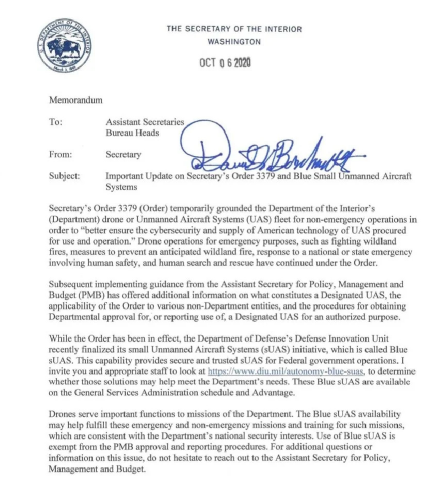Concerns Over Chinese Made Drones Continue as Executive Agencies Update their Drone Policies
Client Alert | 13 min read | 10.19.20
Lawmakers continue to negotiate the 2021 National Defense Authorization Act (“NDAA”), which could prohibit federal procurement or operation of certain foreign-made drones, including those from China, due to national security concerns. Meanwhile, some executive agencies are moving forward with agency-specific restrictions on use of federal funds for drone operations that rely on Chinese-made aircraft. The most recent updates come from the Department of Interior (“DOI”) and the Department of Justice (“DOJ”).
Internal Memorandum Allows Department of Interior Drones to Return to the Skies, with a Catch
Last week, DOI released an internal memorandum (provided in full text below) allowing the Department to purchase certain American-made small unmanned aircraft systems. The memorandum comes almost nine months after the Department grounded its civilian drone program indefinitely in response to growing concerns that Chinese-manufactured UAS or UAS components could pose a security risk. That move saw the DOI halt use of its fleet of nearly 1,000 drones except for approved emergency response operations such as wildland fire response and search and rescue operations.
This week’s memorandum opens the possibility for DOI to resume its full-scale drone program, provided that it uses drones on the Department of Defense’s list of approved drone products. The products, or “Blue sUAS,” come from five US manufacturers: Skydio, Parrot, Altavian, Teal Drones, and Vantage Robotics. The drones reportedly comply with the 2020 National Defense Authorization Act, which prohibits the U.S. military from operating or procuring drones and drone components made in China, and are available for purchase on the GSA Schedule. The memorandum allows DOI to use Blue sUAS to conduct emergency and non-emergency missions without special approval. Drones that are not on the Blue sUAS list may continue to be used for emergency purposes, but only with approval from the Assistant Secretary for Policy, Management, and Budget.

|
DOJ Makes Ban on Chinese Drones Official
In related news, DOJ, recently released an order banning the use of Office of Justice Programs (“OJP”) funds for procurement or operation of drones manufactured by a “Covered Foreign Entity,” which is defined as any entity that is determined or designated within DOJ to be subject to or vulnerable to extrajudicial direction from a foreign government. The definition is a clear reference to China and to concerns that data collected by Chinese owned manufacturers could be transmitted to servers in China, where it could be accessed by the Chinese government under national security laws passed in 2017.
While the order does permit exceptions for operations related to research, training, criminal investigations, or national security, it remains to be seen whether DOJ will create a streamlined process for agencies to apply for an exception. Without an exception, federal agencies and state, local, and tribal governments relying on OJP funds for their drone programs cannot purchase or operate Chinese-made drones or drones with Chinese-made components. The order does not specify whether the ban applies to existing operations, but a mandatory grounding of OJP-funded operations that use Chinese-made drones that do not qualify for an exception would be consistent with previous Executive Branch approaches. Because the ban applies to use of OJP funds at any level, including subcontracts and lower tier procurement vehicles, law enforcement agencies and their contractors will need to carefully review the consequences of this order and the effects it may have on existing drone program contracts.
Insights
Client Alert | 3 min read | 04.24.24
On April 12, 2024, the Tenth Circuit issued a decision in I DIG Texas LLC v. Kerry Creager, which analyzed country-of-origin claims in a manner that diverged from the well-established Federal Trade Commission’s “Made in USA” policy.
Client Alert | 2 min read | 04.24.24
FTC Continues Focus on Tracking Technologies and Personal Health Data
Client Alert | 9 min read | 04.24.24
Client Alert | 4 min read | 04.24.24
Muldrow Case Recalibrates Title VII “Significant Harm” Standard





